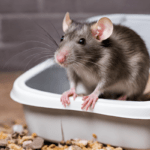Table of Contents
Pets can experience anxiety for various reasons, including changes in their environment, separation from their owners, or unfamiliar situations. Understanding how to handle a pet with anxiety is crucial for their well-being and your peace of mind. This guide provides ten effective strategies to help reduce your pet’s anxiety and improve their quality of life.

1. Identify the Triggers
The first step in handling a pet with anxiety is to identify what triggers their anxiety. Common triggers include loud noises, new environments, separation from their owner, or unfamiliar people or animals. Observing your pet’s behavior and noting when they exhibit signs of anxiety can help you identify these triggers. For more on identifying triggers, visit ASPCA Separation Anxiety.
2. Create a Safe Space
Providing a safe and comfortable space for your pet can help reduce anxiety. This space should be a quiet area where your pet can retreat when they feel stressed. Include their favorite toys, blankets, and bedding to make it cozy and inviting. For more on creating a safe space, see The Spruce Pets Safe Space.
3. Establish a Routine
Pets thrive on routine and predictability. Establishing a consistent daily routine for feeding, exercise, playtime, and rest can help reduce anxiety. A regular routine helps your pet know what to expect and can provide a sense of security. For more on establishing routines, visit AKC Daily Routine.
4. Use Positive Reinforcement
Positive reinforcement can help manage your pet’s anxiety. Reward your pet with treats, praise, or affection when they remain calm in situations that typically trigger anxiety. This helps them associate positive experiences with previously stressful situations. For more on positive reinforcement, see Petfinder Positive Reinforcement.
5. Provide Mental and Physical Stimulation
Regular mental and physical stimulation is essential for reducing anxiety. Engage your pet in activities such as puzzle toys, training sessions, and interactive play to keep their mind and body active. Exercise can help reduce stress and improve overall well-being. For more on providing stimulation, visit PetMD Environmental Enrichment.
6. Try Calming Products
There are various calming products available that can help reduce your pet’s anxiety. These include pheromone diffusers, calming collars, and anxiety wraps. These products can create a calming environment and provide comfort to your pet. For more on calming products, see PetMD Calming Products.
7. Consider Behavioral Training
Behavioral training can be effective in managing anxiety. Techniques such as desensitization and counterconditioning can help your pet become more comfortable with their triggers. A professional trainer can provide guidance and support throughout this process. For more on behavioral training, visit ASPCA Desensitization and Counterconditioning.
8. Use Natural Remedies
Natural remedies such as herbal supplements, CBD oil, and calming treats can help reduce anxiety in pets. Always consult your veterinarian before introducing any new supplements or treatments to ensure they are safe for your pet. For more on natural remedies, see AKC CBD Oil for Dogs.
9. Consult a Veterinarian
If your pet’s anxiety is severe or persistent, consult a veterinarian. They can rule out any underlying medical conditions and provide recommendations for managing anxiety. In some cases, medication may be necessary to help your pet cope. For more on consulting a veterinarian, visit Cornell Feline Health Center Anxiety Disorders.
10. Be Patient and Consistent
Managing a pet with anxiety requires patience and consistency. Progress may be slow, and setbacks can occur, but remaining patient and persistent is key. Celebrate small successes and continue to provide a supportive and loving environment for your pet. For more on patience in training, visit ASPCA Behavioral Help.
Conclusion on How to Handle a Pet with Anxiety
Understanding how to handle a pet with anxiety is crucial for their well-being and your peace of mind. By identifying triggers, creating a safe space, establishing a routine, and using positive reinforcement, you can help reduce your pet’s anxiety. Providing mental and physical stimulation, trying calming products, considering behavioral training, using natural remedies, consulting a veterinarian, and being patient and consistent are all effective strategies. For more pet care tips, check out our Pet Care Guide.
FAQs on How to Handle a Pet with Anxiety
What are common signs of anxiety in pets?
Common signs of anxiety in pets include excessive barking or meowing, pacing, panting, drooling, destructive behavior, and changes in eating or sleeping patterns. If you notice these signs, consult your veterinarian.
Can anxiety in pets be cured?
While anxiety in pets may not be completely cured, it can be managed effectively with the right strategies and support. Consistent training, a stable environment, and professional guidance can help reduce anxiety symptoms.
Are certain breeds more prone to anxiety?
Yes, some breeds are more prone to anxiety than others. For example, small dog breeds like Chihuahuas and Yorkshire Terriers, and certain cat breeds like Siamese, can be more susceptible to anxiety. However, any pet can develop anxiety regardless of breed.
How long does it take to see improvement in a pet with anxiety?
The time it takes to see improvement varies depending on the severity of the anxiety and the consistency of the treatment. Some pets may show improvement within a few weeks, while others may take several months. Patience and persistence are key.
Is medication necessary for managing pet anxiety?
Medication may be necessary for severe cases of anxiety, but it is usually considered a last resort. Consult your veterinarian to discuss the best treatment options for your pet, which may include behavioral training and natural remedies before considering medication.
Can changing my pet’s diet help reduce anxiety?
In some cases, changing your pet’s diet can help reduce anxiety. A balanced diet rich in nutrients can support overall health and well-being, which may alleviate some anxiety symptoms. Always consult your veterinarian before making any changes to your pet’s diet.











